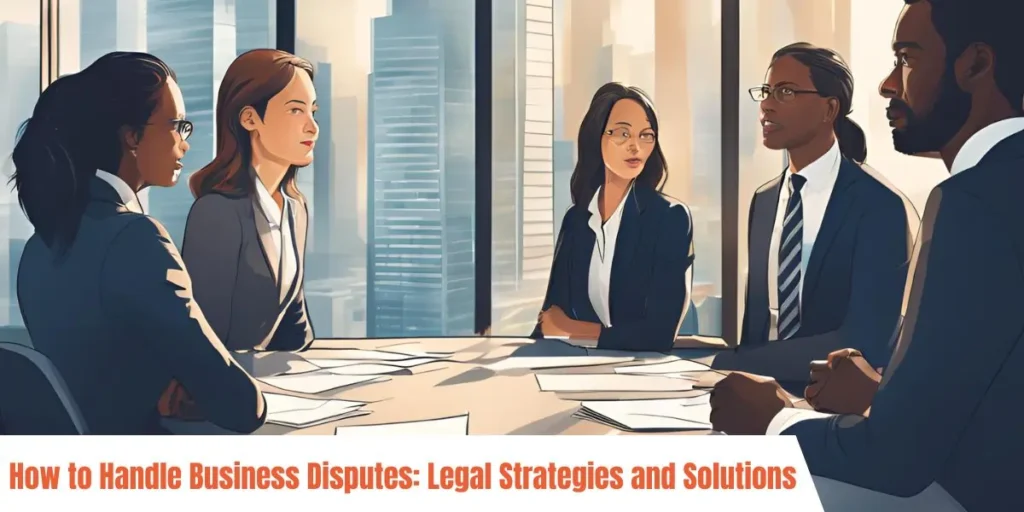How to Handle Business Disputes: Legal Strategies and Solutions
Business disputes are an inevitable part of any commercial venture. Whether they arise from contract disagreements, partnership issues, or supplier conflicts, effectively handling these disputes is crucial for maintaining your company’s stability and reputation. At Legalari, we understand the complexities involved in resolving business disputes and the pivotal role that legal professionals play in this process. This blog explores various strategies for resolving business disputes, emphasizing the importance of legal advice and the role of professionals, including the best Chartered Accountant in Ghaziabad.
Understanding Business Disputes
Business disputes can stem from various issues, including:
- Contract Disagreements: Differences in the interpretation of contract terms or failures to meet contractual obligations.
- Partnership Conflicts: Disputes between business partners over management decisions, profit sharing, or roles.
- Supplier and Vendor Issues: Problems with the supply chain, such as delays, quality issues, or non-compliance.
- Employment Disputes: Conflicts related to employee rights, performance issues, or employment terms.
It is necessary to comprehend your rights and responsibilities and the proper legal tactics to handle these disagreements effectively.
Legal Strategies for Resolving Business Disputes
Review and Understand the Contract
The first step in resolving any business dispute is to review the relevant contracts and agreements. Understanding the terms and conditions laid out in the contract is crucial for determining your rights and obligations. Key areas to focus on include:
- Terms and Conditions: Ensure that all parties adhere to the agreed terms.
- Dispute Resolution Clauses: Check if the contract specifies a dispute resolution method, such as arbitration or mediation.
Tip: Regularly update your contracts and ensure they reflect current business practices and legal requirements.
Negotiate and Mediate
Negotiation and mediation are often the first steps in resolving disputes. These methods involve discussing the issues with the other party and seeking a mutually acceptable solution. Benefits of negotiation and mediation include:
- Cost-Effective: Less expensive than litigation.
- Confidential: Keeps sensitive information private.
- Time-Saving: Faster resolution compared to court proceedings.
Pro Tip: Engage a skilled mediator or negotiator to facilitate discussions and reach an amicable solution.
Seek Legal Counsel
When disputes escalate, consulting with a legal professional becomes essential. The best Chartered Accountant in Ghaziabad can provide invaluable advice on handling financial disputes, while experienced attorneys can guide you through legal proceedings. Legal professionals can help by:
- Assessing Your Position: Evaluating the strengths and weaknesses of your case.
- Advising on Legal Strategies: Recommending the best course of action based on your specific situation.
- Representing You in Court: If necessary, advocating on your behalf in legal proceedings.
Tip: Choose a legal advisor with experience in your industry to ensure they understand the nuances of your business.
Arbitration
Arbitration is a formal method of dispute resolution where a neutral third party makes a binding decision on the matter. Benefits of arbitration include:
- Expert Decision-Makers: Arbitrators are often experts in the relevant field.
- Flexibility: Procedures can be tailored to the needs of the parties involved.
- Enforceability: Arbitration awards are generally enforceable in court.
Pro Tip: Include an arbitration clause to streamline the dispute resolution process in your contracts.
Litigation
Litigation involves taking the dispute to court. Due to its potential costs and duration, it should be considered a last resort. However, litigation may be necessary if other methods fail. Critical aspects of litigation include:
- Filing a Lawsuit: Initiating legal proceedings to resolve the dispute.
- Court Hearings: Presenting evidence and arguments before a judge or jury.
- Judgment: Awaiting the court’s decision, which may include financial compensation or other remedies.
Tip: Ensure you have a strong case before litigation, as it can be time-consuming and costly.
The Role of Legal Professionals in Dispute Resolution
Legal professionals play a crucial role in managing and resolving business disputes. Their expertise ensures that disputes are handled effectively and in compliance with the law. Key roles include:
- Legal Advice: Guiding legal rights, obligations, and strategies.
- Representation: Acting on your behalf in negotiations, arbitration, or court proceedings.
- Documentation: Assisting with the preparation and review of legal documents and evidence.
The Importance of Financial Advisory
In disputes involving financial issues, the best Chartered Accountant in Ghaziabad can offer critical support. They can help with:
- Financial Analysis: Assessing the financial impact of the dispute and providing expert testimony.
- Accounting Records: Reviewing and presenting accounting records as evidence.
- Settlement Negotiations: Assisting with financial aspects of settlement negotiations.
Tip: Incorporate financial advice into your dispute resolution strategy to ensure all financial aspects are thoroughly addressed.
Effective Dispute Management
Managing business disputes effectively requires a combination of legal strategies and professional advice. At Legalari, we are committed to helping businesses navigate disputes with expert legal counsel and financial advisory services. Whether you’re dealing with contract disagreements, partnership conflicts, or supplier issues, our team is here to provide the support you need.
Facing a business dispute? Contact Legalari today for expert legal advice and solutions. Our experienced team, including the best chartered accountant in Ghaziabad, is ready to assist you in resolving disputes efficiently and effectively. Reach out now to schedule a consultation and safeguard your business interests.


